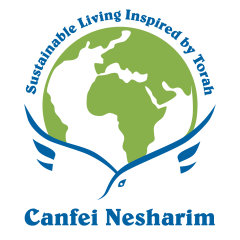by Rabbi Shlomo Levin
This article is printed as part of the Tu b’Shevat Learning Campaign, sponsored by Canfei Nesharim, an organization that is educating the Orthodox community about the importance of protecting the environment.
“Horrible wood-eating ants are going to enter the tree trunk through the hole you want to hammer, devour the tree from the inside, then spread into both of our houses and destroy everything we own!” my next door neighbor shouted at me. “Don’t go wrecking the world in the name of Judaism,” she said with scorn I usually reserve for Iran’s president. Nothing calmed her until I brought a retired plant pathologist to her door.
On Jewish New Years we analyze our deeds and repent. Tu Bishvat, the new year for trees, celebrated February 13th, is a time for me to do some soul searching regarding this tree-related incident with my neighbor. She got carried away about the ants, but this non-Jewish woman made another point that should be considered even by scholars of Jewish law.
Our dispute arose because I was building an eruv. An eruv is a symbolic enclosure that permits observant Jews to carry things on Shabbat, and in order for my eruv to be kosher I needed to nail a six-foot long piece of wood in an exact location on my neighbor’s tree.
I invited my neighbor over for dinner one evening to ask her permission. Since I stained the wood the color of the tree’s bark so it would not be an eyesore I couldn’t think of any reason she would refuse.
But she insisted that nails would harm her tree and that I had no right to damage nature in order to observe my religion.
I told her that I thought there is little difference between her allowing this board on her tree because of my religious needs and her trimming her tree if it damaged my roof. She started to laugh so hard I was afraid she was going to choke on her dinner and need to be resuscitated with the Heimlich maneuver, which I don’t know how to perform.
I took Maimonides’ code of Jewish law down from a bookshelf, and I translated for her a section from Laws of Kings 6:10. He writes that it is forbidden to cut down trees, but only if it done for a destructive purpose. In this case my purpose was not destructive, I explained, because the eruv would enhance my observance of Shabbat.
“There have to be some limits on use of nature,” she insisted. “Just because someone has a constructive purpose doesn’t mean that they can do whatever they want. Natural resources are finite. However noble our reasons when exploiting them, when they are gone they’re gone and using everything for ourselves is not right.”
She had a point. Does Jewish law put any limits on using natural resources when we are doing a mitzvah?
Fortunately for my eruv project, this woman was way off base regarding the harm that could be done by a nail. She even told me that the nail could rust, spread upwards in the sap, and turn the leaves into a sick rust color instead of green. At that point I was the one laughing so hard that I started to wonder if she would save me if I choked.
The next day I had a friend who worked as a plant pathologist speak with her. He explained that not only would a few nails do no harm, but forest managers put nails in trees in iron-deprived soils with nails in order to help them grow.
After a lengthy consultation with this expert convinced her that disaster was more than a hammer blow away, she allowed me to nail up my board. Now the eruv is complete.
The question she raised, however, is unresolved. What limits does Jewish law put on consumption of natural resources when our purpose is to do something positive, or even to do a Mitzva? In previous eras, when humanity lacked the ability to cause large scale destruction to our planet, the limits stated by Maimonides were sufficient. As long as our purposes in exploiting nature were constructive and not reckless, our actions were acceptable.
Today that is no longer the case. Our environment cannot sustain continuously using the earth’s resources to enhance our lifestyles. Tu Bishvat is a good occasion to reflect on the Jewish implications of this issue. While the fear of leaves turning orange from rust may be silly, other environmental issues are not.
Rabbi Shlomo Levin has been the full-time rabbi of Lake Park Synagogue in Milwaukee, WI since September 2003. He received his Rabbinic ordination from the Israeli Chief Rabbinate and from Rabbis Shlomo Riskin and Chaim Brovender of Yeshivat Hamivtar in Efrat, Israel. He is also a graduate of the Sha’al and Amiel Rabbinic training programs.
